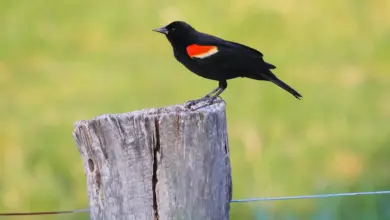Are Muscovy Ducks Aggressive? or Are They Friendly? Answered!
Are Muscovy Ducks Aggressive?
Are you planning to keep a muscovy duck as a pet? It’s important to know about their temperament. Well, they are not cuddly animals like cats and dogs, but they are affectionate in their own way. Read on to find out more.
Raising poultry birds offers a myriad range of fun experiences, but being chased around by angry ducks isn’t one of them.
Muscovy ducks are generally known to be friendly birds, to the point where they’re now being kept as pets for companionship rather than meat.
However, like most duck species, Muscovies can also get quite aggressive at times.
If you plan to raise Muscovy ducks, this article is a must-read for you.
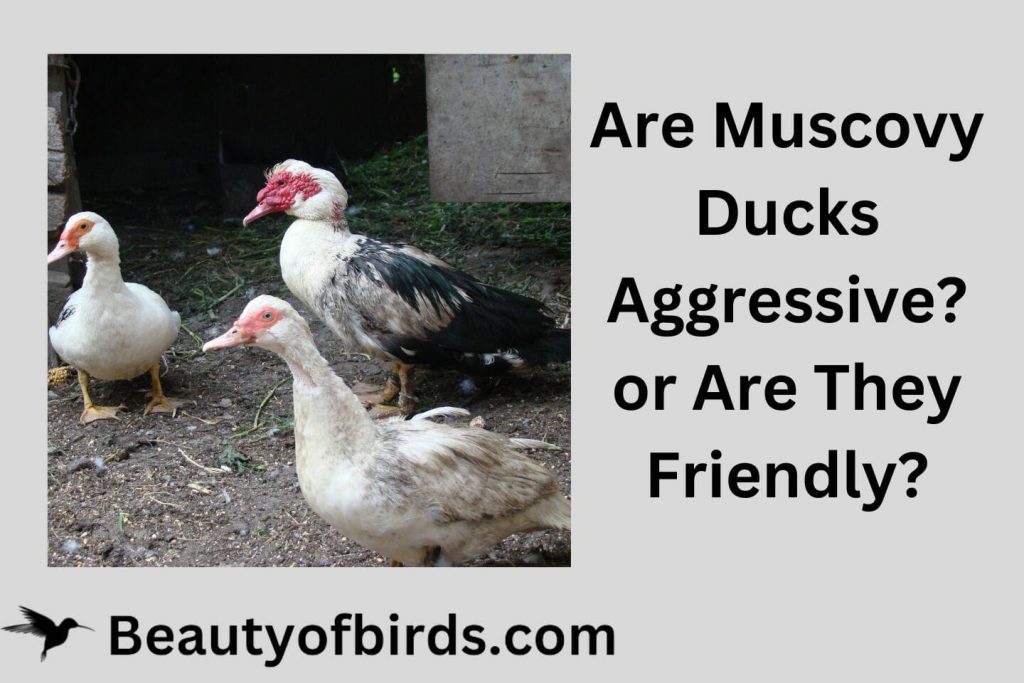
Are Muscovy Ducks Aggressive?
Generally speaking, quiet and gentle birds make great companions for humans.
Still, there are times when they might turn aggressive – especially the males.
You’re more likely to notice aggressive behavior among Muscovies during certain times of the year, such as the mating and breeding seasons.
Are Male Muscovy Ducks Aggressive? Are They Territorial?
While female ducks of this breed make fierce mothers, the males are more likely to be aggressive when looking for a mate.
To begin with, these ducks are territorial and will actively attack anyone who intrudes into their space.
They use their wings, beaks, and claws to fend off intruders – other pets and humans alike.
When their territorial response is triggered, Muscovy ducks tend to freeze on the spot and let out an alarmed call to alert the rest of the flock.
Muscovies can flock together to defend their territory quite fast, and being swarmed by a flock of aggressive ducks is something you’d want to avoid.
Other Reasons Why Muscovies Are Aggressive
Apart from defending their turf, Muscovy ducks may also turn aggressive due to a variety of other reasons. These include:
Mating behavior
Having an aggressive drake during the mating season is quite common.
In a bid to deter potential rivals, Muscovy drakes turn quite aggressive toward other animals while mating.
When under excess sexual tension, the males may turn to humans to vent their urges in the absence of a female duck.
Even though they don’t mean to be aggressive in this case, it might look like an attack.
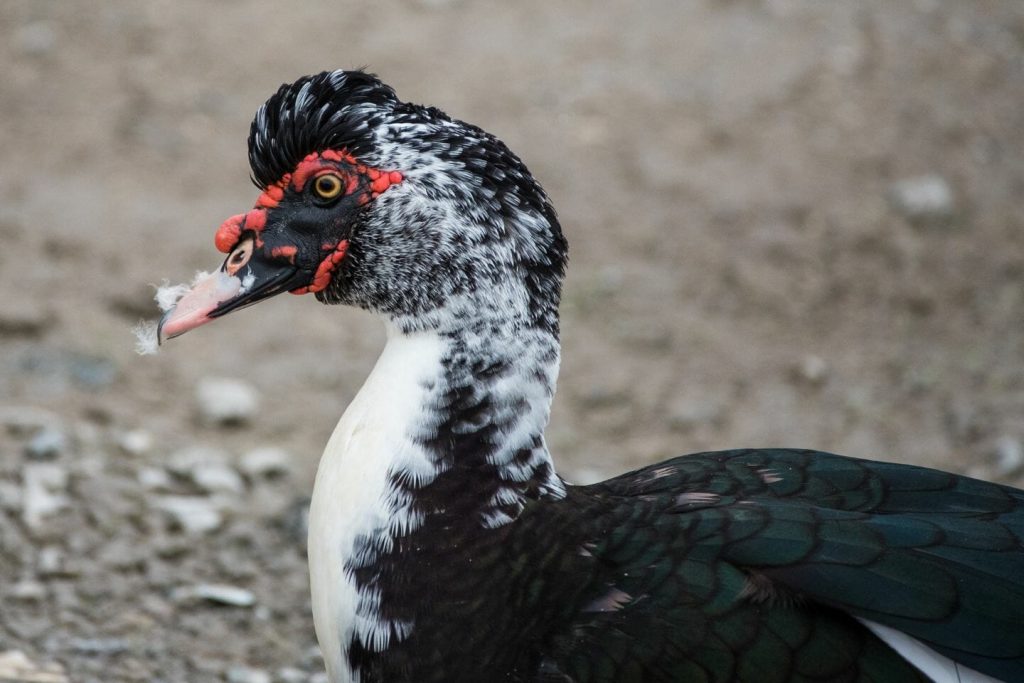
Dominance
Male Muscovy ducks may also display aggressive behavior to assert dominance.
This is a common trait among other duck breeds as well – the males like to dominate others!
Apart from other ducks, they might also attack other pets and even humans.
Protecting the offspring
As I mentioned earlier, female Muscovies are extremely protective ducks that fight hard to keep their chicks safe.
Their strong maternal instincts drive them to attack anyone who touches or gets too close to the ducklings.
Establishing pecking order
Poultry birds have a system of hierarchy known as pecking order.
Each bird in the order can peck another of a lower rank without any retaliation but has to submit to being pecked by another of a higher rank.
Muscovy ducks decide on their pecking order through fights, in which both male and female ducks partake.
In case they perceive you as one of them, the ducks may also try to include you in the hierarchy by challenging you to a fight.
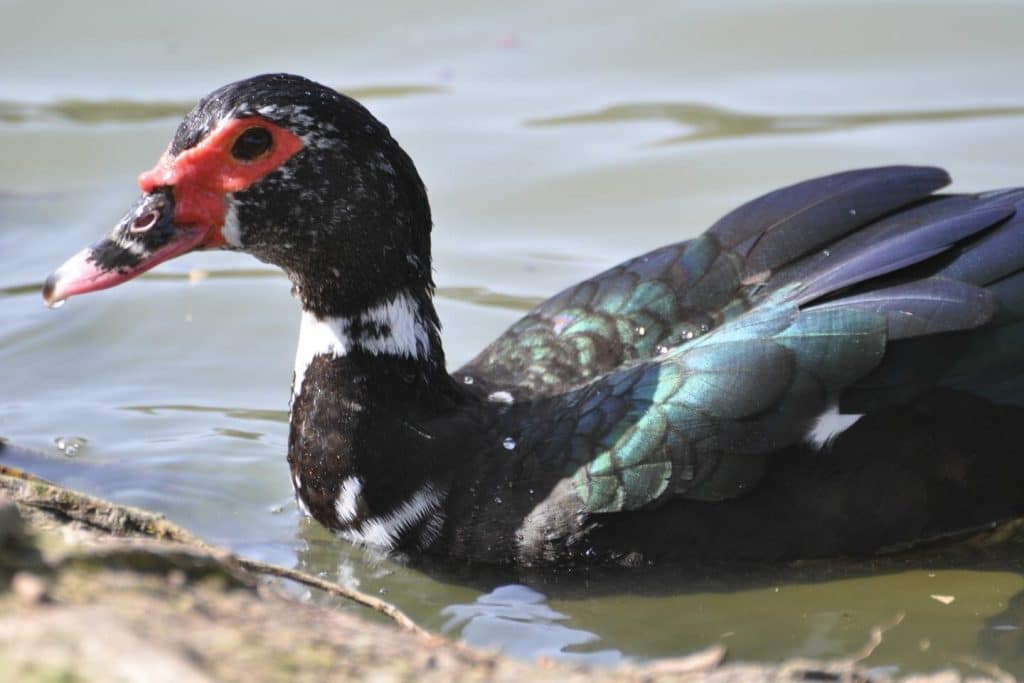
How To Stop Your Muscovies From Fighting Each Other?
Fights between Muscovy ducks can vary from small skirmishes to brutal and bloody ones.
They’re even known to kill each other or cause fatal injuries.
When raising Muscovies, you should always be alert for the first signs of a fight and stop them immediately. Here’s what you can do:
Separate them
The simplest solution is to separate the aggressive duck from the rest of the flock.
If you have Muscovies being aggressive toward other breeds, it’s best to keep them in separate coops.
However, separation can’t be a permanent solution as Muscovies are social ducks.
Provide a mate
If you’re raising Muscovies for eggs and meat, you likely have ducks of both sexes already.
However, in case you have a lone Muscovy, it’s highly recommended to provide the bird with a mate.
The suppression of sexual urges can cause aggression in ducks too.
Train the ducks
This may take some time and effort, but you can try to train the aggression out of your pet ducks.
Discourage aggressive behavior early on while they’re still babies. This will significantly reduce aggression when the ducks grow up.

Are Muscovy Ducks Dangerous?
Muscovy ducks aren’t very dangerous to humans, despite the aggressive behavior they might potentially show.
They can still draw blood with their sharp claws and peck or bite you, but the chances of severe injuries aren’t that high.
However, the same can’t be said about Muscovy ducks attacking other ducks and poultry.
As I said earlier, the attacks can often be fatal and result in the loss of a pet.
Do Muscovy Ducks Attack Humans?
Unfortunately, Muscovy ducks do attack humans sometimes.
They tend to be friendly, but as I explained earlier, there are times when they show aggressive behavior, even toward their owners.
You should be cautious when approaching a new Muscovy duck that’s yet to be fully accustomed to you.
Why Do Muscovy Ducks Attack?
You can’t really straight jacket the reasons why a muscovy duck may attack.
They might attack other pets and humans due to their mating habits, the tendency to dominate, their protective and territorial nature, etc.
You might also get attacked if a Muscovy feels threatened by your presence.
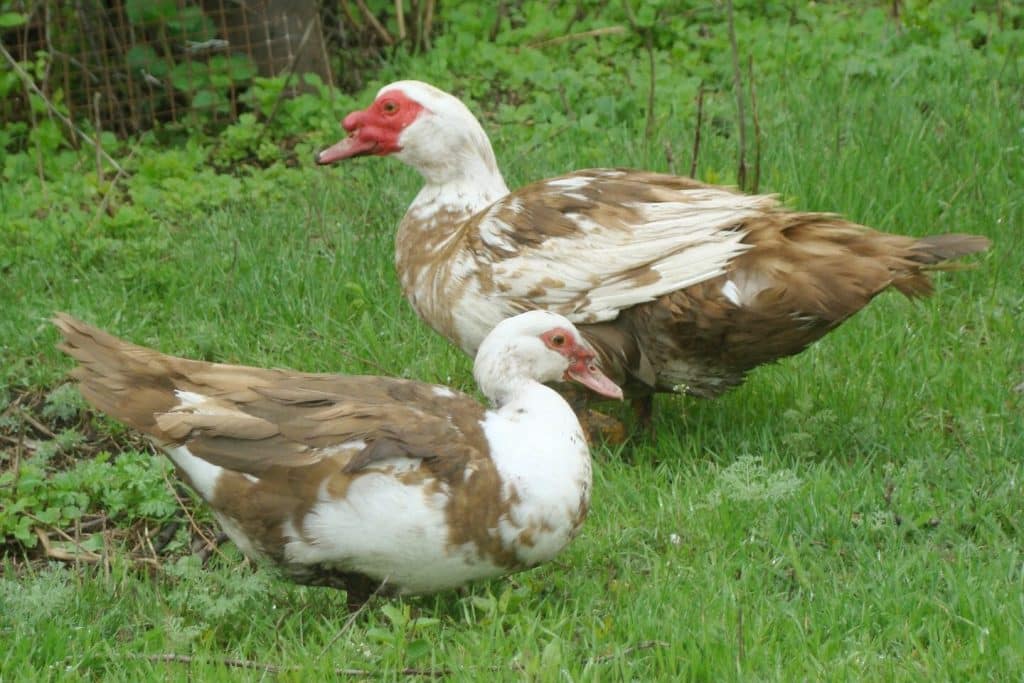
Do Muscovy Ducks Bite?
Like pretty much all other ducks, Muscovies are capable of biting too.
Both male and female Muscovy ducks may bite you, especially when they feel threatened.
Needless to say, their large bills are more than enough for this purpose.
Unless the duck is biting you playfully with no intention to harm you, it can hurt quite badly.
Why Do Muscovy Ducks Bite?
Muscovy ducks may bite you when they turn aggressive, which can occur due to various reasons.
Male Muscovies are more likely to bite, and it’s possibly because they see you as either a threat or a rival.
Are Muscovy Ducks Friendly?
Despite their occasional aggressive tendencies, Muscovy ducks are still much friendlier than other common duck breeds.
They have a calm and affectionate temperament that makes them amazing pets, besides a good poultry choice for tasty eggs.
Of course, wild ducks are instinctively wary of humans and might easily feel threatened and get aggressive.
To raise your Muscovies as friendly pets, you’ll have to behave with them accordingly.
They won’t grow fully comfortable with human companionship unless you spend enough time with them.

Do Muscovy Ducks Give Affection?
Muscovy ducks are affectionate, but not in the same way as other pets like cats and dogs.
For example, you can’t usually expect a duck to come running to your lap. They don’t like being cuddled either, like many other birds.
However, Muscovies raised as pets can show affection in other ways, like rushing over to greet you when you return home.
They might even enjoy sitting at your feet while you work.
Are Muscovy Ducks Good Around Children?
Thanks to their distinct personality, Muscovy ducks are good around children too.
These ducks are curious and intelligent, which makes them perfect for keeping kids entertained.
Besides, it’s a good idea to start with relatively gentle breeds when getting your children accustomed to poultry.
Just be careful during the mating and nesting seasons, and make sure the kids don’t do anything to threaten or irritate the ducks.
Female Muscovies might be a better choice as pets for children as the males are more temperamental ducks and get aggressive more often.
Do Muscovy Ducks Get Lonely? Are They Social Among Themselves?
Muscovies are social ducks and usually stay in pairs or small groups.
They are seasonally monogamous, which means they mate with just one other bird per season. So they do attach themselves for at least a year.
That said, you may still keep a lone Muscovy duck as a pet if you adopt the bird early before it has a chance to experience social interactions with other ducks.
You’ll have to spend time with it every day, though – else the poor bird would get lonely.
Also, keep in mind that as the duck reaches sexual maturity, the lack of a mate can cause behavioral problems. It might even fly away looking for a mate.

Can a Muscovy Duck Make Friends With a Pekin?
Muscovy ducks usually get along well with Pekins, Mallards, and other ducks. So, you can raise them together if you wish with no problems.
However, keep in mind that Muscovies don’t usually mate with other breeds.
Even if they do, the offspring would be sterile – known as “mule ducks”.
It’s not too uncommon for people to deliberately cross-breed Muscovies with Pekins and Mallards.
While the mules aren’t of any use in egg production, they’re particularly healthy ducks and offer a lot of tasty meat.
Frequently Asked Questions
Why Does My Female Muscovy Duck Attack My Other Two Male Muscovy Ducks?
This could be due to competition for resources or mates.
If two male muscovy ducks are in close proximity, the female may see them as a threat and will attack them both in an attempt to protect herself or her territory.
Providing plenty of space for the muscovy ducks should help mitigate some of the aggression issues between them.
It is also important to provide them with ample shelter and food sources to reduce competition for these resources as well.
Can You Help Muscovy Ducks Out of Tree?
Muscovy ducks are one of the rare breeds of flighted ducks. And they love to roost in trees, sometimes on very high branches.
Females muscovies have been known to roost as high as 60 ft up. The heavier males often restrict themselves to about half this height.
Why Does My Muscovy Duck Bite Me?
If a muscovy duck does not feel safe around you, then it may attempt to defend its territory by pecking or biting.
Another possible reason is that it is looking for food or water from you as a form of begging.
This can become a learned behavior if the muscovy duck receives an immediate reward from you each time it begs.
Finally, pay attention to body language, which may indicate that the muscovy duck is feeling agitated or stressed – respect its personal space and do not approach too closely.
Can Muscovy Ducks Live Alone?
While they will likely be happier and more socially active when kept with others of their kind, they are not dependent on having a companion for survival.
Muscovy Ducks make great pets since they typically have gentler personalities than other breeds and can be socialized to interact pleasantly with humans.
They can also be kept alone if desired. However, proper housing and nutrition should still be provided to ensure their overall well-being and long-term health.
Do Muscovies Attack Each Other?
Generally, muscovy ducks are territorial creatures and are more likely to attack others of their own species than other species.
However, if male and female Muscovy ducks establish a bond between themselves, they may not attack each other even when provoked by others.
The degree to which Muscovies attack or defend themselves from other male ducks varies with individual birds; it is possible for some to live peacefully together without any aggression.
Wrapping up
Ultimately, you may rest assured that Muscovies make great domesticated ducks.
Indeed, they might sometimes be aggressive and attack you, but that applies to almost all domestic birds.
Once you get a better understanding of your feathered friends, you’ll have an easier time dealing with it.
Thank you for reading, and I hope your Muscovies won’t cause you too much trouble with their aggressive behavior.

